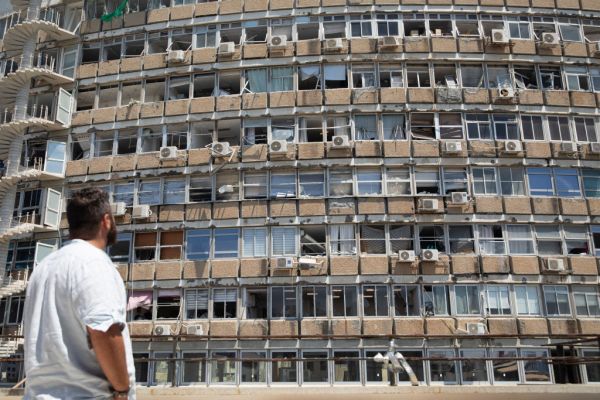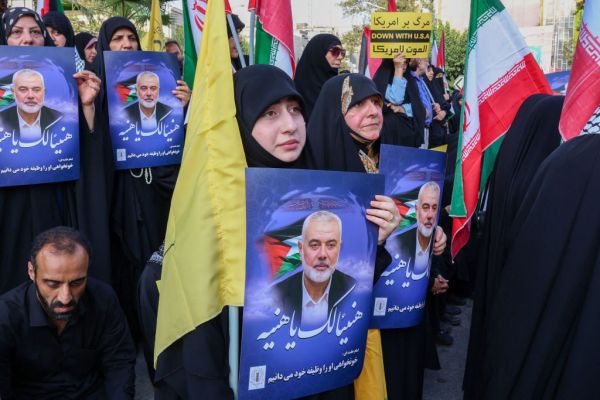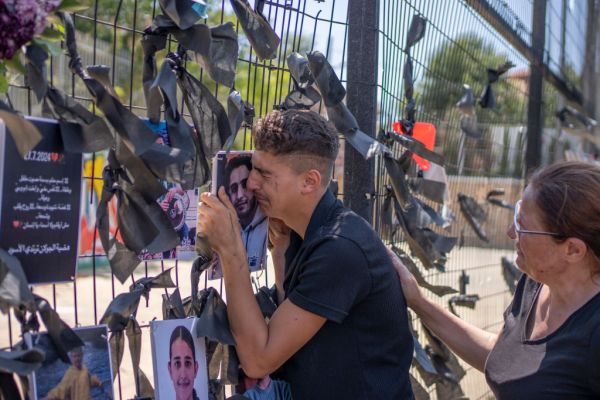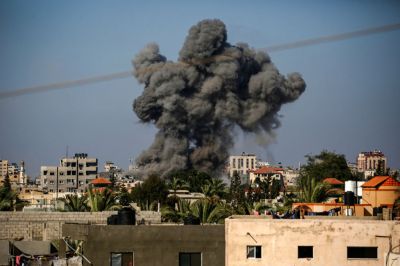TEL AVIV, Israel—As Israelis awaited an imminent attack by Iran, Hezbollah, or both this week, the U.S. dispatched senior officials to a Middle East on the brink of a wider war. On Thursday, they will meet with Arab state representatives and Israeli negotiators in Qatar for the latest and perhaps final push to broker a ceasefire-for-hostages deal with Hamas.
Speaking here Wednesday, diplomats from the United Kingdom, Germany, and the United States made the urgent case for an agreement the Biden administration hopes will defuse tensions across the region as Iran and its proxies vow to retaliate for the assassinations of terror chiefs in Tehran and Beirut last month. U.S. Middle East envoy Brett McGurk arrived in Egypt on Tuesday and CIA director Bill Burns will reportedly attend ceasefire talks Thursday. Secretary of State Antony Blinken delayed a planned trip to the region amid the looming threat of escalation.
President Joe Biden said Tuesday that while efforts to reach a ceasefire were “getting harder,” he was “not giving up.” Asked by a reporter if he thought Iran would hold off on a retaliatory strike against Israel if a deal with Hamas is reached, the president responded, “That’s my expectation.”
But by relying on negotiations over Gaza to manage the threat posed by Iran, the U.S. may have cornered Israel into making a binary choice: Reach a deal, even if it’s on unfavorable terms, or risk a multifront war. Unnamed senior Iranian officials told Reuters Tuesday that Tehran and its allies would launch a direct strike against Israel should talks fail. Meanwhile, new Hamas leader Yahya Sinwar could view the prospect of Iran’s intervention as a reason to harden his own demands or ditch the negotiating table altogether. Hamas refused to send a delegation to Qatar on Thursday, though Arab state officials will communicate Israel’s conditions to the terror group for ending more than 10 months of hostilities in Gaza.
“It’s in the interest of Sinwar that there be a war between Israel, Iran, and Hezbollah,” Michael Oren, the former Israeli ambassador to the United States, told The Dispatch. “Hassan Nasrallah, the head of Hezbollah, and the Iranians have said that if Sinwar reaches a ceasefire, they’ll cease fire as well. So that essentially becomes an incentive for Sinwar not to reach a ceasefire, because what will a war with Israel and Iran and Hezbollah do? It will draw all of Israel’s military attention to the north, exhaust Israel, and isolate Israel further.”
And significant daylight between the two warring parties remains. Hamas, which continues to obfuscate about the number and identity of living hostages it still holds, has demanded a full Israeli withdrawal from Gaza in phase one of the agreement. But Israel appears determined to retain control over the strategically important Philadelphi Corridor, an 8-mile stretch of land between Egypt and Gaza through which Hamas smuggles arms and cash into the Strip. Israel also wants to vet the people returning to northern Gaza, to prevent Hamas from reconstituting there.

Other sticking points, like whether Jerusalem can exercise veto power over the Palestinian prisoners Hamas requests to free as part of a deal, also threaten to disrupt progress toward even a temporary truce. The group’s wish list includes people serving life sentences for murdering Israeli civilians, reportedly including Marwan Barghouti, a popular Palestinian nationalist and the planner of multiple lethal bombings during the Second Intifada. This issue became even more politically fraught on Monday, when a Hamas terrorist who was released as part of November’s temporary ceasefire and hostage deal shot and seriously injured an Israeli man in the West Bank.
Zooming out, a permanent ceasefire looks even further off, despite pressure from the U.S. and its European allies. “There’s the big picture in which the two sides are fundamentally at odds. Israel insists that it is not going to stop until it achieves its war aims, which include toppling Hamas as a military and governing organization. That’s victory for Israel, and they’ve said it at every stage,” said Lazar Berman, a Jerusalem-based analyst and diplomatic correspondent at the Times of Israel. “Hamas—and it’s been consistent as well—wants the exact opposite. They want to win, and winning for them is surviving.”
As it pushes for a diplomatic resolution, the U.S. has also moved additional military assets to the Middle East to help Israel defend itself in the event of escalation by Iran or Hezbollah. On Monday, Defense Secretary Lloyd Austin ordered the deployment of a guided-missile submarine and expedited the transit of the USS Abraham Lincoln aircraft carrier to the region.
But a strong defense posture alone may not be enough to deter a broader war, as Hezbollah proved in October by joining Hamas in attacking Israel despite U.S. warnings and deployments. In northern Israel, near-daily rocket, drone, and missile attacks have killed scores of soldiers and civilians and forced some 100,000 people from their homes for more than 10 months. And with Israel’s counterstrikes against Hezbollah commanders, including the killing of senior military chief Fuad Shukr in Beirut last month, the simmering conflict risks boiling over into an all-out war.
Though Hezbollah will likely hold its fire in the event of a Gaza ceasefire deal being reached, it would continue to pose an unbearable threat to northern communities and beyond. The group possesses a trained fighting force and an arsenal in Lebanon of more than 200,000 rockets and missiles capable of striking deep into Israeli territory.
“In order to get the close to 100,000 residents of Israel’s north from 43 different communities home, there is going to have to be a major change in the way Hezbollah operates,” Enia Krivine, senior director of the Foundation for Defense of Democracies’ Israel program, told The Dispatch. Where diplomacy has failed to push the terrorist group back over the last 18 years, she added, military force might be needed. “The question is: Is that time now, or is that time six months from now, or nine months from now? It’s not a matter of ‘if,’ it’s a matter of ‘when.’”
Correction, Aug. 15, 2024: A previous version of this article stated that an Israeli man was killed in the West Bank by a terrorist who was released in a November deal. The Israeli man was shot and severely injured.







Please note that we at The Dispatch hold ourselves, our work, and our commenters to a higher standard than other places on the internet. We welcome comments that foster genuine debate or discussion—including comments critical of us or our work—but responses that include ad hominem attacks on fellow Dispatch members or are intended to stoke fear and anger may be moderated.
With your membership, you only have the ability to comment on The Morning Dispatch articles. Consider upgrading to join the conversation everywhere.